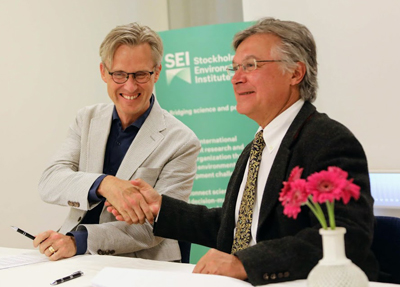UNCTAD and the Stockholm Environment Institute team up to map pollution hotspots in Africa and Asia to understand manufacturing's environmental impact in the regions.
Pollution is one of the biggest challenges facing many developing nations, whose policymakers can feel they must sacrifice the environment in the name of industrialization.
In a drive to understand this challenge and use good research to address the issue, UNCTAD is teaming up with the Stockholm Environment Institute (SEI), a global non-profit that tackles environment and development challenges.
A new agreement between the two organizations, signed on 10 May in Stockholm, charts their cooperation on trade and environment matters, with an initial focus on manufacturing pollution, under the Sustainable Manufacturing and Environmental Pollution (SMEP) programme.
“This agreement is already off to a flying start with a breakthrough research programme to better understand pollution from manufacturing processes in Africa and Asia,” said UNCTAD’s head of trade and environment, Lucas Assunção.
The SMEP programme is a research initiative supported by the United Kingdom’s Department for International Development (UK-DFID).
The initial research is being led by SEI at the University of York, in England.
“SEI is looking forward to collaborating around high-level and credible issues, including commodity trade, international finance flows and pollution,” said SEI executive director Måns Nilsson.
“Our joint project to map pollution hotspots in Africa and Asia is already mobilizing research expertise from across SEI,” he said.
“We look forward to working more closely with UNCTAD to provide relevant knowledge and actionable tools, and as the convener of change makers that we have in common.”
Cartography of contamination
The goal of the memorandum of understanding (MoU) is to establish a long-term cooperation instrument between SEI and UNCTAD.
The first concrete activity – the pollution mapping project – will assess impacts and prioritize research.
Lisa Emberson, SEI York centre director, said they were excited to explore the impact of small and medium scale industry and manufacturing processes in sub-Saharan African and South Asia.
“We will assess the extent of pollution, environmental degradation and the impacts on human health, with the aim of reducing such impacts in the future,” she said.
Environmental degradation and pollution have been directly linked to several life-threatening illnesses and chronic health problems that affect manufacturing workers in many developing countries.
They are also responsible for affecting the public’s health when there is contamination of air, drinking water, soil, crops, livestock, fish and other resources.
And some production processes are as harmful for the economy as public health because of low productivity outputs.
Studies on these effects not only help manage impacts, but also support the identification of areas for further research.
Future view
Sustainable Development Goal 12, which deals with responsible consumption and production, is the overall driving force behind the programme.
The partners hope their collaboration will magnify their individual efforts to help manufacturing sectors and support resource circularity in developing countries.
They also believe the MoU could lead to additional areas of collaboration, such as supply chain transparency, international finance, bio-economy, and transnational climate impact.
The SMEP programme will launch further in-depth research on the critical sectors and issues identified. Calls for proposals will be published with UK-DFID from 2020 onwards.
The UK-DFID-funded SMEP programme seeks to reduce the environmental and social impacts of manufacturing in developing countries by funding research activities and developing technical solutions that will help reduce the levels of pollution and environmental degradation.
UNCTAD acts as a strategic technical partner to the programme, providing advice to the programme and helping to disseminate results to the international community.

